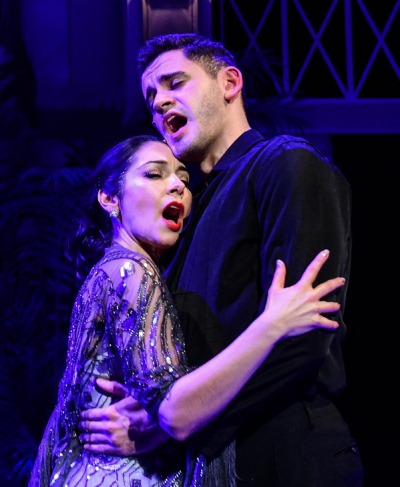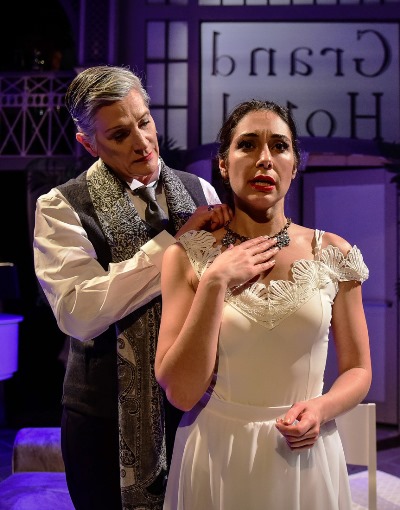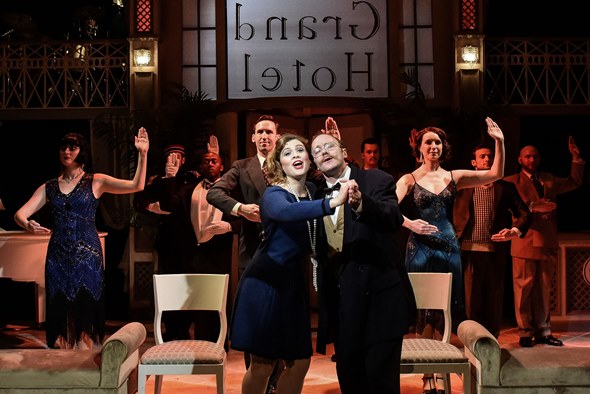‘Grand Hotel’ at Kokandy Productions: Lobby teeming with life, fraught with secret regrets
Review: “Grand Hotel,” with music and lyrics by Robert Wright, George Forrest and Maury Yeston. Staged by Kokandy Productions at Theater Wit through May 27. ★★★★
By Lawrence B. Johnson
I’ve always loved “Grand Hotel,” since I first saw the 1932 film with its incredible all-star cast that only begins with Greta Garbo, John Barrymore and Joan Crawford. In 1989, the film, based on a novel by Vicki Baum and a play by William A. Blake, was transmuted quite successfully into the musical that Kokandy Productions now offers in a concept and cast that get right at the poignant heart of the story.
 If the lobby of the Grand Hotel isn’t exactly a cross-roads of the damned, it is at least an agora of the melancholy. It’s a posh hotel, in Berlin, where between the wars and with the stock market crash just over the horizon, a random assortment of souls has converged – a terminally ill bookkeeper looking to have one really good time before he dies, a typist who aspires to film stardom, a celebrated ballerina whose star is fading, a baron with big debts he can’t pay, a business executive on the brink of failure.
If the lobby of the Grand Hotel isn’t exactly a cross-roads of the damned, it is at least an agora of the melancholy. It’s a posh hotel, in Berlin, where between the wars and with the stock market crash just over the horizon, a random assortment of souls has converged – a terminally ill bookkeeper looking to have one really good time before he dies, a typist who aspires to film stardom, a celebrated ballerina whose star is fading, a baron with big debts he can’t pay, a business executive on the brink of failure.
It’s all just the stuff for witty, wistful song lyrics and the ironic buoyancy of dance. And at the core of what’s best about the Kokandy production is Brenda Didier’s energetic, Twenties-tinged choreography. Likewise, director John D. Glover manages the Grand Hotel’s fraught front of house with the aplomb of a tested traffic cop. Miserable people are falling over each other in the story line, and Glover manages to preserve clarity amid their frazzled counterpoint.
You might fairly argue that “Grand Hotel” depends for its life on three of the five central characters. There’s something inescapably unsympathetic about the empty soul that is Baron Felix von Gaigern, an impecunious aristocrat under the watch and threat of people he owes a lot of money. Erik Dohner paints a convincing portrait of a man with no particular purpose who gets through each day in the belief, or airy hope, that something will turn up.
 It, or rather she, finally does. What blooms for the baron is love, in the form of one of the characters we really do care about: a once-great Russian ballerina now approaching 50, still beautiful but now feeling the inexorable toll of age on bodies. Michelle Jasso is radiant as a dancer whose heart seems to break in a new place with each increasingly flawed performance.
It, or rather she, finally does. What blooms for the baron is love, in the form of one of the characters we really do care about: a once-great Russian ballerina now approaching 50, still beautiful but now feeling the inexorable toll of age on bodies. Michelle Jasso is radiant as a dancer whose heart seems to break in a new place with each increasingly flawed performance.
If the baron lives in a void, businessman Herman Preysing (Jeremy Trager) fashions an expedient place for himself in a web of deceit. Poised on the precipice of ruin, Preysing concludes that playing by the rules has brought him to this pass, and so he puts off the inevitable with a big lie. And then this married desperado throws what’s left of his character on the heap with a lurid offer to another character of genuine appeal, the typist Flaemmchen.
In a company of able singers and dancers, Leryn Turlington is exceptional as a young woman who has perhaps lost her innocence but not her ability to dream. She imagines herself in Hollywood, which the predator Preysing assures her is only a train ride from Boston, where he wants to take her if she will “be nice” to him. Turlington’s endearing Flaemmchen shows a charitable heart when she finds someone even more bereft than she is – desperately ill Otto Kringelein, who has liquidated his worldly possessions to fund a few nights at the Grand Hotel with the seemingly rich and precariously famous.
 Kringelein, played – and danced and sung – with uncappable life force by Jonathan Schwart, is the story’s infectious core character, the irresistible magnet whose lust for living can only make you happy to be in his presence. Everyone is drawn to him, like a compass needle to the north pole. In Schwart’s effervescent performance, Kringelein exudes appreciation for being a player among high-class players, an unequal raised up however briefly to social parity. He’s grateful just for being noticed.
Kringelein, played – and danced and sung – with uncappable life force by Jonathan Schwart, is the story’s infectious core character, the irresistible magnet whose lust for living can only make you happy to be in his presence. Everyone is drawn to him, like a compass needle to the north pole. In Schwart’s effervescent performance, Kringelein exudes appreciation for being a player among high-class players, an unequal raised up however briefly to social parity. He’s grateful just for being noticed.
One other outsider also wins our compassion, the ballerina’s devoted, longtime assistant Raffaela, played with a perfect blend of yearning and forbearance by Liz Norton. Raffaela is in love with the dancer, who will never know – much less return the sentiment. It is one more thread of secret sorrow in a scene carpeted with regret at the Grand Hotel.
Hats off to set designer Jeffrey D. Kmiec, who in a few strokes has created the aura of a luxury hotel, and to costumer John Nasca for stamping this motley gang with individuality at first glance. And not least to music director Aaron Benham, who has molded a wealth of songs into an attractive, cohesive show and integrated a strong cast of singers with a punchy stage band.
Related Link:
- Performance location, dates and times: Details at TheatreInChicago.com
Tags: Aaron Benham, Brenda Didier, Erik Dohner, Jeffrey Kmiec, Jeremy Trager, John D. Glover, John Nasca, Jonathan Schwart, Leryn Turlington, Liz Norton, Michelle Jasso, Vicki Baum, William A. Blake



